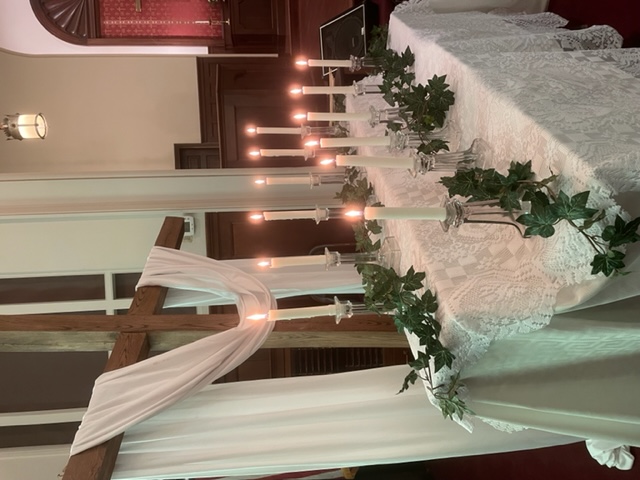Presbyterian tradition is one that welcomes questioning & tolerates doubt. Presbyterians disagree on many things, but Jesus Christ is the core of our faith. We have no life or salvation apart from him. To be a member of a Presbyterian Church, it is required to meet with the Elders and make a public confession of faith in Jesus Christ as Lord & Savior.
Church leaders (deacons, elders, & pastors) are required to take more detailed & rigorous “ordination vows,” pledging to be guided by the historic confessions of the Reformed faith, and to work together according to the constitution of the PCUSA, called the Book of Order.
More of our characteristic beliefs are described below:
1) Protestants
2) Providence/Predestination
3) Preaching
4) Practical
1) Since we are Protestants, Presbyterians believe that the Bible, not church tradition, is our final authority for faith & life, 2nd only to Christ,who is named in the scripture as God's ultimate & living Word. (John 1) Holy Scripture names only 2 sacraments which Christ commanded his followers to carry out: Baptism & the Lord's Supper /Holy Communion. We practice both infant & believers' baptism, because we find both in scripture. The people of the Church perform the actions of the sacraments, but God's Holy Spirit is the real power that unites us with Jesus, washing away our sin in Baptism, feeding us with his eternal life in Communion and thru both sacraments empowering us to do his work in the world.
2) Providence & Predestination are 2 unique & sometimes controversial doctrines associated with the Presbyterian & Reformed branch of the Christian family tree. (There are many other “brands” of Christians who also share these convictions.) God's providence -also called God's sovereignty-- -means that God is at work in & thru everything to achieve God's purposes, even though people and natural forces act according to their own will &/or nature. “God draws straight with crooked lines,” is one way to put it. Ephesians 1: 11 says [God] works out everything in conformity to the purpose of his will.
Predestination refers to God's pure grace in choosing those who will be saved. Even though it is urgent that individuals make a faith commitment, God gets 100% of the credit for our salvation—it's not a reward for our decision. God always initiates & we respond; we love because God first loved us. “You did not choose me, but I chose you,” says Jesus (John 15:16)
One scripture passage that ties all this together is Roman 8:28-29
In all things God works for the good with/for those who love him, who have been called according to his purpose. For those God foreknew he also predestined to be conformed to the likeness of his Son, that he might be the firstborn among many brothers & sisters . . . .
3) Preaching is a very important part of Presbyterian worship & tradition. In our church you will not hear a short homily like in Catholic, Lutheran, Episcopal or Orthodox churches. Presbyterians demand to hear substantial preaching with faith, passion & intelligence. Nor will the sermon be found at the end of the service, followed by an altar call, because the congregation immediately begins to respond to God's word thru our prayers & sacraments, songs & offerings.
The emphasis on preaching is one reason Presbyterians have historically insisted on highly educated clergy. Yale & Princeton universities were founded by Presbyterians, along with 62 other Presbyterian-related colleges in the US alone. “Presbyterian missionaries have planted churches, built hospitals, and started schools on every continent. Seeds sown by those missionaries have, in many places, developed into self-sustaining churches and institutions now led by local Christians. Among them are the Presbyterian Church of Korea, the Evangelical Theological Seminary in Cairo, and Good Shepherd Hospital in the Democratic Republic of Congo. More than 94 million Christians around the world now belong to churches that were founded or co-founded by Presbyterian Church (U.S.A) mission workers. [click here to link to World Mission Agency website]
4) Presbyterians are Practical; we believe in putting our faith in action. We understand that Faith by itself, if not accompanied by action, is dead. (James 2:17) and this can be seen in our church in simple ways: like the free Bibles that are always available to anyone, our commitment to Elijah's Bowl, our enjoyment of publically acting out the story at Christmas & Palm Sunday, and our support of hands-on mission projects thru Samaritan's Purse and Church World Service.
The most famous example of Presbyterian practicality is John Calvin, our # 1 theologian, who not only reformed the church in 16th-century Geneva, Switzerland, but rehsaped the economy & infrastructure of the city too. He famously upgraded the sewer-system & by permitting money to be loaned at interest (citing Matthew 25:27, the parable of the talents) Calvin altered the economic trajectory of Switzerland & all of Europe. Word got around that “There are no beggars in Geneva.”
According to REV DR FRANCIS NIGEL LEE - - BRISBANE, AUSTRALIA
Calvin's reforms included the following:
Short-changing merchants were punished (citing Isa. 1:22).
Jobs were created, to help the unemployed (Matthew 20:3ff).
Sewers were installed, to combat disease (Leviticus 13:45ff & 14:39ff).
Dentists were tested and licensed to pull teeth (Exodus 21:22-27 & Proverbs. 25:l9ff).
Begging was prohibited (Psalm 37:25 & Acts 3:6).
For safety's sake, chimneys were to be installed in homes with fireplaces (Nehemiah 3:11& 12:38 with Hosea 13:3).
Railings were to be fitted to balconies, to protect small children from falling off (Deuteronomy 22:8).

First Presbyterian Church
238 Market Street, Sunbury, PA 17801 (570) 286-7211